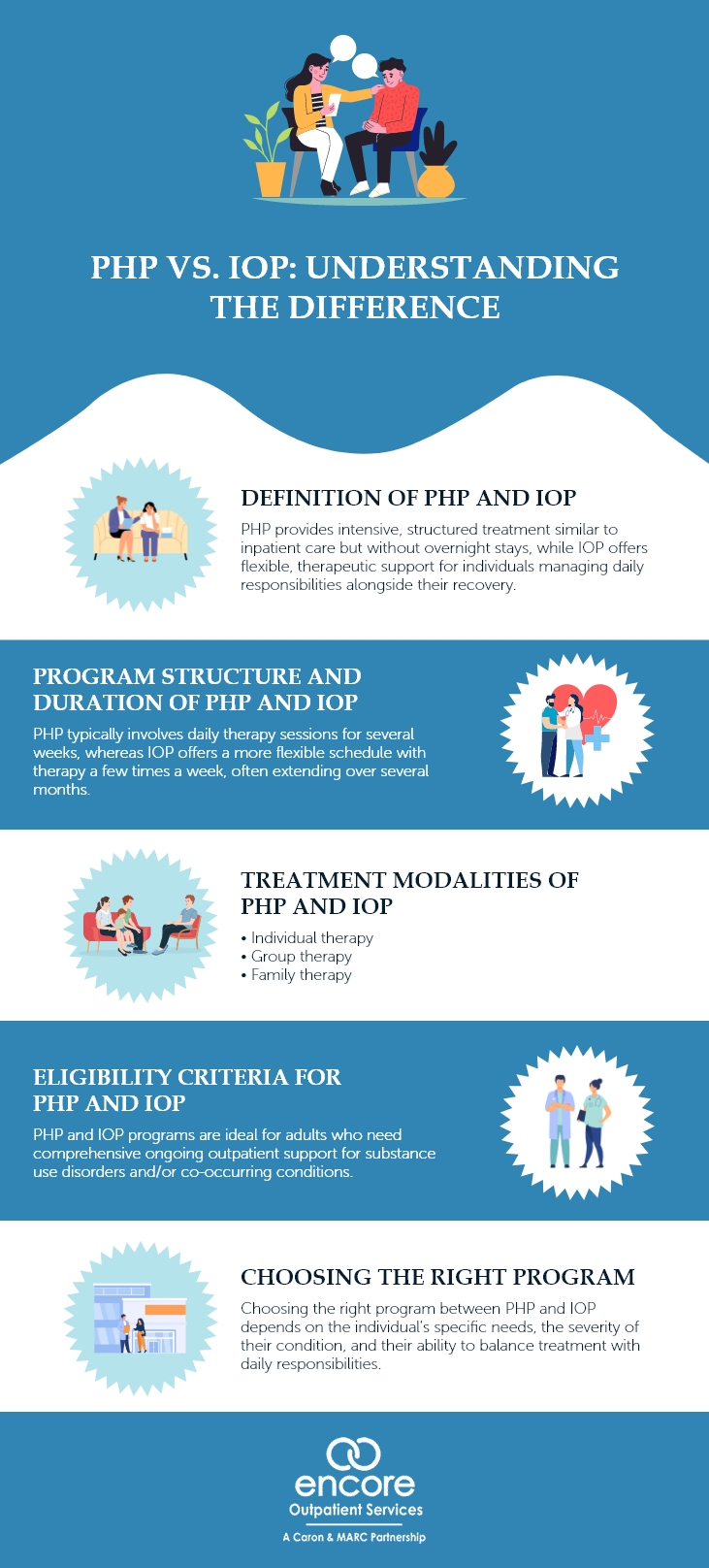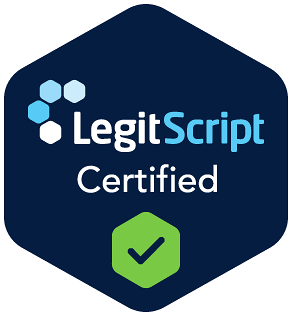Our dedication lies not just in treating symptoms but in addressing the root causes, offering a holistic approach that integrates the best of therapeutic practices with the warmth of community support.
PHP vs. IOP: Understanding the Difference

When it comes to mental health and addiction treatment, understanding the nuances between different treatment programs is crucial for making informed decisions. This blog post delves into the key distinctions between Partial Hospitalization Programs (PHP) and Intensive Outpatient Programs (IOP), two prominent models in contemporary treatment approaches. Aimed at demystifying these terms, we offer a comprehensive comparison covering their structure, intensity, and suitability for various needs. Whether you are a patient or a loved one, this post will provide valuable insights into PHP and IOP, guiding you toward a clearer understanding of these vital treatment options.
Definition of PHP and IOP
Partial hospitalization programs are specialized treatment programs designed for individuals who require intensive therapeutic intervention, similar to inpatient treatment, but do not need 24-hour supervision. PHP typically involves a structured schedule of therapy and activities, offering a comprehensive approach to treatment while allowing patients the flexibility to return home each day. This level of care is often suited for individuals transitioning from inpatient treatment or those who need more support than traditional outpatient services.
Intensive outpatient programs, on the other hand, are treatment programs that provide structured therapy and support but with a lower time commitment compared to PHP. IOPs are designed for individuals who are able to manage a significant portion of their daily life independently but still require regular, structured support to address their mental health or substance use challenges. The goal of IOP is to facilitate recovery and provide coping strategies while allowing participants to maintain their regular work, school, or family responsibilities.
Both PHP and IOP are integral parts of the continuum of care in mental health and addiction treatment, offering different levels of support based on individual needs and circumstances.
Objectives of PHP and IOP
The primary objective of PHP treatment is to provide an intensive level of care for individuals who require more support than traditional outpatient services but do not need hospitalization or residential care. PHP aims to stabilize a patient’s condition, reduce symptoms, and enhance coping skills, thereby facilitating a smoother transition to less intensive forms of care. The focus is on comprehensive, multidisciplinary treatment that addresses a wide range of mental health or substance use challenges.
Intensive outpatient programs are designed with the objective of offering structured therapy and support while allowing individuals to continue their daily routines, such as work or school. The main goal of IOP is to provide ongoing treatment that helps individuals manage their conditions effectively, prevent relapse, and maintain progress made during more intensive treatment phases. IOP seeks to equip patients with the skills and strategies necessary for long-term recovery and wellness, emphasizing the importance of balancing treatment with personal responsibilities.
Both PHP and IOP share the common goal of promoting sustained recovery and well-being, but they differ in intensity and structure, allowing individuals to choose a program that best aligns with their specific needs and life circumstances.
Program Structure and Duration of PHP and IOP
PHP is characterized by its structured and intensive nature. Patients typically engage in treatment activities for several hours each day, five days per week. This high level of care, which often includes a mix of group and individual therapy, medical management, and other support services, is designed for those needing more intensive treatment while still living at home or in a sober living environment. The duration of a PHP varies but generally ranges from two to six weeks, depending on individual progress and needs.
IOPs, in contrast, offer a less rigorous schedule, requiring patients to participate in treatment for a few hours per day, typically three to five days a week. This structure is intended to provide substantial support and therapy while accommodating patients’ work, school, or family commitments. IOPs usually extend over several months, with the duration being flexible to adapt to the evolving needs of the individual.
Both PHP and IOP are structured to facilitate a gradual step-down in treatment intensity, allowing patients to transition smoothly toward a sober life.

Treatment Modalities of PHP and IOP
The treatment modalities employed in IOP and PHP programs are diverse and tailored to address the multifaceted needs of individuals with mental health and substance use disorders.
Both IOP and PHP programs adopt a comprehensive approach involving:
- Individual therapy
- Group therapy
- Family therapy
- Trauma-informed care
- Holistic, expressive, and experiential therapies
- Psychiatric care
- Medication management and MAT
This integrated treatment often includes evidence-based therapies such as Cognitive Behavioral Therapy (CBT), Dialectical Behavior Therapy (DBT), and other modalities that focus on skill-building, coping strategies, and relapse prevention skills.
Although the types of treatment provided by IOP and PHP share similarities, they are distinct in their application and emphasis. IOPs specifically focus on enabling individuals to manage their conditions effectively within a less structured environment. This approach maintains the core treatment principles seen in PHP but adapts them to suit a setting that requires individuals to balance treatment with their daily responsibilities.
Both PHP and IOP are designed to provide holistic and patient-centered care, adapting their treatment modalities to support each individual’s unique journey toward recovery and wellness.
Eligibility Criteria for PHP and IOP
Our PHP and IOP programs are ideal for adults who need comprehensive ongoing outpatient support for substance use disorders and/or co-occurring conditions.
PHP level of care is suitable for the following patients:
- Need for Intensive Support – Suitable for those requiring more support than traditional outpatient treatment.
- Transition from Inpatient Care – Ideal for individuals stepping down from inpatient or residential treatment programs.
- Stable Living Environment – Requires a stable and supportive home environment or sober living environment.
- Ability to Attend Treatment – Commitment to participate in treatment sessions.
- Moderate to Severe Conditions – Appropriate for moderate to severe mental health or substance use disorders.
In contrast, IOP treatment services are suitable for the following patients:
- Stable Enough for Less Intensive Care – Suitable for individuals with stable conditions not requiring daily intensive treatment.
- Post-PHP Transition – Ideal for those transitioning from a PHP or other similar levels of care.
- Balancing Treatment with Daily Activities – Ability to manage treatment alongside work, school, or family responsibilities.
- Regular Therapeutic Support – Need for regular, but not daily, structured therapeutic support.
- Commitment to Recovery – Willingness to engage in ongoing treatment and recovery processes.
Admissions to both PHP and IOP require a comprehensive assessment by mental health professionals to determine the most appropriate program based on the individual’s specific needs and circumstances.
Choosing the Right Program
Selecting the appropriate program, whether it be a PHP or an IOP, is a crucial step in your recovery journey. The decision should be based on several key factors:
- Severity of Condition – PHP is generally more suitable for severe conditions requiring intensive support, while IOP is better for those with stable conditions seeking regular support.
- Daily Commitments – PHP requires a significant time commitment akin to a full-time job, whereas IOP allows for more flexibility, accommodating work, school, or family obligations.
- Support System – PHP and IOP both necessitate a stable and supportive home environment or sober living environment, but PHP might require a more robust support system due to its intensive nature.
- Treatment History – If you’re transitioning from an inpatient or residential treatment setting, PHP or IOP might be a logical next step.
- Personal Preferences – Consider personal comfort and preferences regarding treatment intensity and structure.
- Professional Evaluation – Most importantly, consult with mental health professionals and addiction specialists for an assessment. Their expertise is invaluable in guiding you toward the program that best fits your individual needs.
Choosing the right program involves a careful evaluation of these factors, ensuring that the selected treatment aligns with the individual’s specific needs and promotes the most effective path to recovery.
If you are considering the next step in your recovery journey, Encore’s partial hospitalization program and intensive outpatient program offer structured, comprehensive treatment options tailored to your needs. Our PHP serves as an ideal transition from residential treatment, operating Monday to Friday, 10 am to 4 pm, focusing on substance use and dual diagnosis disorders. Our PHP program provides a balanced mix of intensive treatment, aligning with the American Society of Addiction Medicine’s (ASAM) level 2.5 standards.
For those seeking a flexible yet effective treatment for addiction and co-occurring mental health disorders, Encore’s IOP is an excellent choice. Meeting ASAM’s level 2.1 criteria, our IOP combines various outpatient services, offering personalized care to fit your unique journey. IOP is offered on weekdays from 10 am to 1 pm and 6 pm to 9 pm.
At Encore Outpatient Services, we believe in the power of community and support in recovery. Many of our patients form lasting friendships that continue to support their recovery long after treatment ends. Join us for a journey of recovery where you are encouraged not only to work hard on your recovery but also to enjoy the process of regaining health, making new friends, and acquiring new skills. Take the first step today towards a healthier, fulfilling life.
Let Us Support You On Your Recovery Journey!
Copyright 2026 Encore Outpatient Services | All Rights Reserved



